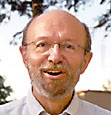By Bob Allen
Glen Stassen, an evangelical peace activist who taught Christian ethics more than 50 years, died April 26 in Pasadena, Calif., months after being diagnosed with metastatic prostate cancer.
 Stassen, 78, the Lewis B. Smedes Professor of Christian Ethics at Fuller Theological Seminary, pioneered the “just peacemaking” theory, recognized internationally as an alternative to both pacifism and “just war.”
Stassen, 78, the Lewis B. Smedes Professor of Christian Ethics at Fuller Theological Seminary, pioneered the “just peacemaking” theory, recognized internationally as an alternative to both pacifism and “just war.”
Stassen taught at Southern Baptist Theological Seminary from 1976-1996. In 1979 he helped organize a meeting at Deer Park Baptist Church in Louisville, Ky., joining a group in the church that had been meeting to discuss and pray about the need for a greater peace witness in the Southern Baptist Convention. They were joined by an American Baptist peacemaking group started by pacifists in the early days of World War II that expanded influence during the Cold War-era to non-pacifists concerned about the threat of nuclear war.
The dialogue led a year later to the launch of the Baptist Peacemaker, a quarterly magazine edited by Glenn Hinson and Carmen Sharp, and another gathering at Deer Park Baptist Church in 1984, which formed and organized the Baptist Peace Fellowship of North America.
Stassen was born Feb. 29, 1936, in Minnesota, the grandson of German immigrants. His father, Harold Stassen, was governor of Minnesota from 1939-1943, helped write the United Nations Charter in 1945 as a delegate appointed by President Franklin Roosevelt, served as a special peace envoy during the Eisenhower administration and ran nine times for president as a liberal Republican.
Early influences on Glen Stassen came at age 6, when his father resigned as governor to join the U.S. Navy, and the dropping of atomic bombs on Hiroshima and Nagasaki when he was 9. He grew up in a German Baptist tradition (his father served as president of American Baptist Churches USA in the 1960s) and accepted Christ during a revival meeting at age 11.
Stassen majored in nuclear physics at the University of Virginia and worked in nuclear research as a military contractor after graduation in 1957. Before long he became convinced enough people were working on splitting the atom and too few studying how to keep its destructive force in check.
He had married a Southern Baptist and decided to enroll at Southern Baptist Theological Seminary in Louisville, Ky., where he was influenced by teachers including Eric Rust and Henlee Barnette and met Clarence Jordan, author of the Cotton Patch Gospels and founder of Koinonia Farm.
Stassen arrived at Southern just after most professors he hoped to take were fired in a 1958 power struggle with the administration. He transferred to Union Theological Seminary in New York City. While at Union he participated in the March on Washington in 1963, where he ran into his father, neither of them knowing the other was planning to attend.
Stassen earned his Ph.D. at Duke University in 1967. He taught as an instructor at Duke 1963-64, assistant professor at Kentucky Southern College (now part of the University of Louisville) 1964-69, visiting scholar at Harvard 1969-1972 and associate professor of philosophy and religion at Berea College 1972-1976.
Stassen was elected to the faculty of Southern Seminary as associate professor of Christian ethics with tenure in 1976. He moved to Fuller Theological Seminary, a multi-denominational evangelical school with a main campus in Pasadena, Calif., amid changes at Southern Seminary following the election of Albert Mohler as president in 1993.
In 1992 Stassen wrote a book, Just Peacemaking, that called for replacing just-war theory, a doctrine of military ethics used to ensure that a war is morally justifiable since the days of St. Augustine and Thomas Aquinas, with “transforming initiatives” to reduce hostilities before they escalate into war.
Last year the Baptist World Alliance honored Stassen with the Denton and Janice Lotz Human Rights Award, recognizing him as “arguably the leading Baptist peace theorist-activist of the 20th century” whose “influence is felt well beyond the confines of the Baptist family.”
Other books written by Stassen include Kingdom Ethics: Following Jesus in Contemporary Context, which he co-authored with David Gushee in 2003. The Christian Century rated Stassen’s 2012 book, Thicker Jesus: Incarnational Discipleship in a Secular Age, one of the year’s Top 10.
Stassen, who was a member of First Baptist Church in Pasadena, is survived by his widow, Dot Lively Stassen; sons Bill, Michael and David; and his sister, Kathleen Berger, head of the social sciences department at Bronx Community College of the City University of New York.
Funeral arrangements are pending.
